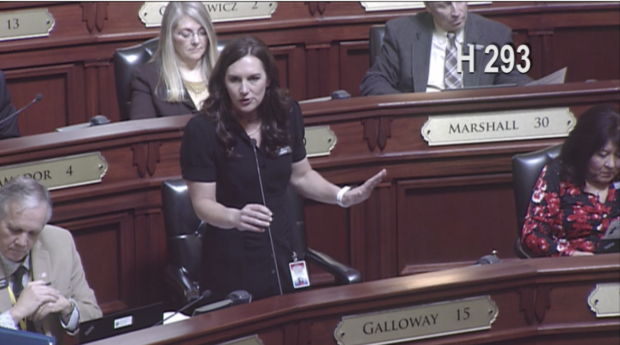The House Wednesday passed a bill to allow parents to withdraw students from schools that are not fully open by April 1, and allow state payouts for those families to seek a different educational option.
House Bill 293 passed the House on a vote of 55-15, after lengthy debate.

The bill’s sponsor, freshman Rep. Codi Galloway, R-Boise, said her bill supports schools that are open for fully in-person learning, and encourages schools that are not open to do so.
“If you choose to remain closed to the students of Idaho, we have to provide them another option,” Galloway said.
Idaho has largely enabled individual districts to decide whether and how students can return to in-person classes during the pandemic. Despite widespread closures last spring, most schools returned to some form of in-person instruction in the fall of 2020. By the end of March, 82 percent of the state’s students are expected to be in-person full-time, according to an Idaho Education News analysis. Most others would be in some form of hybrid learning, and only charter school remains entirely online.
If parents remove children from a district that is not providing at least four days of in-person classes, the bill would withhold funding for that student from the district, and instead give it to the parents to pay for alternative education.
The Idaho Association of School Administrators and Idaho School Boards Administration testified against the bill in committee, arguing it takes local control away from districts that have had to manage competing interests during the COVID-19 crisis.
House floor debate was split, between Republicans arguing in favor of getting students back to school, and critics who said the bill ignores the health considerations of COVID-19 and is an example of government overreach.
“Let’s trust our local boards. This is not the way to do it,” said Rep. Sally Toone, D-Gooding.
HB 293 now heads to the Senate.
House committee rejects Powerball bill
In a move that could affect several millions of dollars of K-12 funding, the House State Affairs Committee pulled the plug on the Idaho Lottery’s Powerball game.
The committee rejected a bill that would have allowed the lottery to remain in the Powerball compact in August, when the game expands in Australia and the United Kingdom.
Lawmakers raised multiple issues, from questions about the agreement to concerns about a state-run lottery, Melissa Davlin of Idaho Public Television reported Wednesday.
Idaho generates about $28 million in Powerball sales, and keeps half of the money, Davlin reported.
The lottery distributes 62.5 percent of its dividend to public schools, and 37.5 percent to the Permanent Building Fund, which is used to bankroll college and university buildings, among other public projects. Based on that formula, a $14 million revenue loss could come to about $8.75 million for K-12 and $5.25 million for buildings.
House passes bill to prohibit extra credit for voting
A bill by Rep. Caroline Nilsson Troy, R-Genesee, to block colleges and universities from providing extra credit for voting sailed through the House on a 63-6 vote.
House Bill 299 adds a section to Idaho code explicitly saying public officials can’t offer extra credit to encourage a student to vote, or to influence a students’ vote for or against a specific candidate.
The University of Idaho Argonaut reports that the Associated Students of the University of Idaho passed a bill two years ago to encourage professors to give extra credit for voting, after concerns about low voting turnouts for midterm and general elections. Some students raised concerns that professors were encouraging students to vote for a specific candidate, the Argonaut reported. Troy told the student paper she also had concerns that the practice could result in unfair disadvantages for students who couldn’t make it to the polls.
“It could be considered a quid pro quo,” Troy told the student paper.
HB 299 heads to the Senate.
Bill to expand Advanced Opportunities advances without opposition
The House also approved a proposal to clarify that Idaho’s Advanced Opportunities funds can be used to pay for proctoring fees, administrator fees and the cost of a college admissions test.
House Bill 250, sponsored by Rep. John McCrostie, D-Garden City, sailed through the House 68-0. It also heads to the Senate.
Idaho Education News reporter Kevin Richert contributed.
Idaho Education News covered Wednesday’s hearings remotely.
